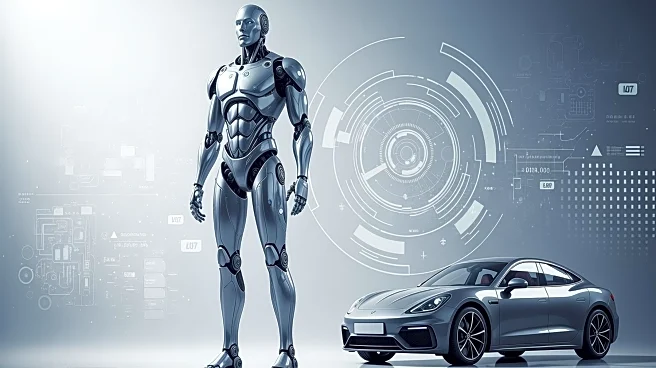What's Happening?
XPeng has introduced its latest humanoid robot, named 'Iron', during its AI Day event in China. This development marks the company's expansion beyond electric vehicles into advanced robotics. Iron is part
of XPeng's 'AI mobility' strategy, which includes vehicles, flying cars, and humanoid robots. The robot has been in development for over five years and is set for industrial trials, with mass production expected by the end of 2026. Iron features a mechanical structure with over 60 joints, mimicking human biomechanics, and is equipped with XPeng's Turing-series AI chips. The robot is initially aimed at industrial and commercial environments, rather than consumer households.
Why It's Important?
XPeng's unveiling of the 'Iron' humanoid robot signifies a strategic shift towards integrating AI and robotics into its business model. This move could position XPeng as a leader in the emerging field of humanoid robotics, potentially influencing the future of automation in industrial settings. The development of Iron highlights the growing trend of automotive companies diversifying into technology sectors, which may lead to increased competition and innovation. XPeng's focus on high-end robotic mobility and dexterity could drive advancements in AI applications, impacting industries such as manufacturing, logistics, and service automation.
What's Next?
XPeng plans to commercialize the 'Iron' humanoid robot within two years, targeting industrial and commercial markets. The company will likely continue refining the robot's capabilities, focusing on enhancing its mobility and dexterity. As XPeng progresses towards mass production, it may seek partnerships with other technology firms to expand its reach and accelerate development. The success of Iron's deployment could influence XPeng's future strategies, potentially leading to further investments in AI and robotics. Stakeholders, including competitors and industry analysts, will monitor XPeng's progress closely, assessing the impact of humanoid robotics on the broader technology landscape.
Beyond the Headlines
The introduction of humanoid robots like 'Iron' raises ethical and regulatory considerations, particularly regarding labor displacement and AI governance. As XPeng advances its robotics technology, discussions around the ethical use of AI and the potential impact on employment may intensify. The company's commitment to integrating AI across multiple platforms could drive conversations about the responsible development and deployment of intelligent systems. Long-term, XPeng's innovations may contribute to shaping global standards for AI and robotics, influencing policy decisions and societal attitudes towards automation.










